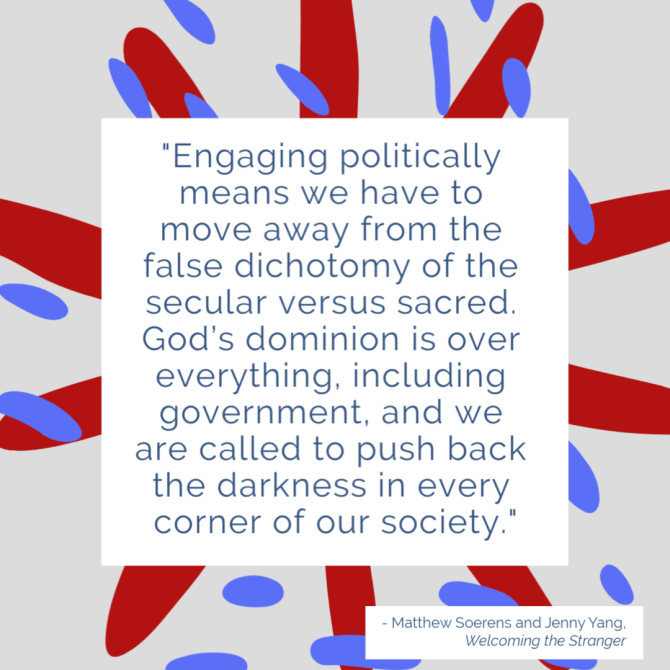Immigration is one of the most high-profile issues of our time, but until quite recently, I have been woefully uniformed about immigration—legal and otherwise—in America. It wasn’t until the 2016 presidential election that I began to think more critically about this issue. Like many Christians, I started to recognize immigration as more than just a political problem that the government should handle, but a human rights issue as worthy of my attention as abortion, human trafficking, and other causes related to the sanctity of human life.
I knew this was a topic I needed to learn more about, but with so many impassioned voices muddying the debate with emotionally charged rhetoric and disputable “facts”, I was unsure of where to start. After hearing Matthew Soerens on the Vox podcast recently, I immediately purchased his book as a first step toward becoming better educated on the topic.

Authors Matthew Soerens and Jenny Yang are both Evangelical Christians and World Relief immigration experts who desire to move beyond politics and rhetoric to offer a Christian perspective on immigration. In Welcoming the Stranger, Soerens and Yang walk readers through the history of immigration in America, offer a careful analysis of the immigration issue in our country today, and explain the limitations of our current immigration system. Through stories of immigrants in and out of the system, they put a human face on this polarizing issue. They also address many concerns many Christians might have, debunk several myths related to immigration, present ideas for changes that can be made, and—most importantly—help Christians understand why this issue matters and what we can do to become a part of the solution. The book ends with a chapter-by-chapter discussion guide, making this an ideal book to read within a group setting.
As I read, I became aware of many of my personal biases and had many of my own concerns/misconceptions addressed. Here is a small sampling of things I learned through this book:
+ Immigration is not a new issue: our nation has a storied history with immigration challenges, and many past (and present) policies have been fueled by racism, xenophobia, and misinformation.
+ Many undocumented immigrants file tax returns each year and actually contribute more in taxes than they take in services. (Although this is more true on the federal level than at state and local levels.)
+ Studies consistently find no correlation between immigrants and crime; in fact, immigrants (with and without legal status) consistently have lower crime rates than native-born US citizens.
+ Three out of four foreign born individuals in the United States are present lawfully (either because they are naturalized citizens or lawful permanent residents, or are here under temporary work visas or as legal refugees).
+ Since 1980, there has not been a single lethal terrorist attack in the United States perpetrated by an individual who entered the country through the US refugee resettlement program, and there has never been a documented case of a terror attack perpetrated by an individual who entered the United States by illegally crossing the US-Mexico border.
+ The odds of being killed by a terrorist who came to the United States as a refugee or who is in the United States illegally are 1 in 3.6 billion and 1 in 10.9 billion, respectively, per year.
+ Immigration based on market needs will strengthen our economy, and immigration based on family has the potential to strengthen our social fabric and culture. (I’d honestly never considered the positive impact immigrants can have on our nation!)
+ Most immigrants want to come into the Untied States legally, but in many instances our current system makes it nearly impossible for them to do so.

Beyond clearing up misconceptions and alleviating some of my fears pertaining to immigration, the authors make a compelling case for why Christians need to care about this issue. Immigration is a common theme in Scripture, with immigrants playing some of the most important roles in the Biblical narrative. The Bible contains numerous passages instructing compassionate dealings with immigrants, whom we should treat with dignity and respect. We are to welcome these “strangers” but must soon move to recognizing them as neighbors, whom we are called to love as ourselves. This treatment pertains to both legal and illegal immigrants: as the authors note, “we can love, serve, and welcome immigrants, regardless of their legal status, and still be fully in compliance with the law.”
Soerens and Yang don’t stop at describing the what of immigration and the why of Christian involvement in this issue; they also provide clear and comprehensive solutions for immigration reform that would make illegal immigration more difficult while facilitating pathways for immigrants to come legally. Following these suggestions for policy change, they outline clear ways that churches can get involved through serving, giving, education, and advocacy. This isn’t just something that would be “nice” for Christians to do: it is a Biblical imperative to advocate for justice—especially on behalf of those who cannot speak for themselves—just as Jesus advocates for us.
Immigration is likely to remain a hot-button issue in America for generations to come. But I am glad that Christians are beginning to take this issue seriously, and I’m thankful for compassionate, justice-minded individuals like the authors of this book who are paving the way for Christians as we continue Jesus’ redemptive and restorative work as advocates on behalf of humanity. If you are a Christian and are seeking answers and guidance on this issue, PLEASE read this book!
My Rating: 5 Stars!
